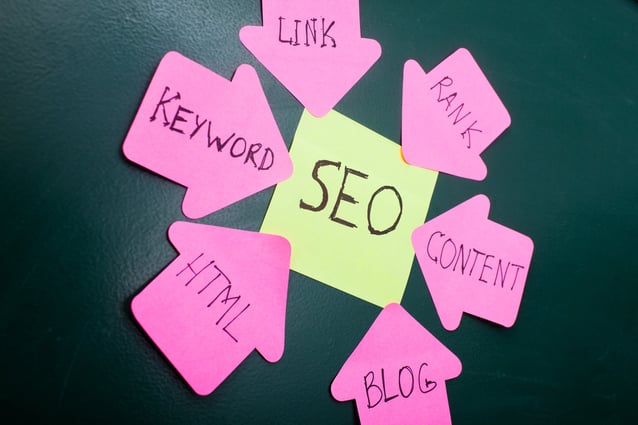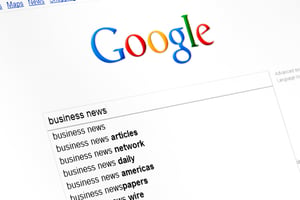Inbound Marketing Blog
for Manufacturers and Healthcare Companies
Free SEO Tips for Beginners: Understanding SEO Vocabulary

If you’re looking for free SEO tips for beginners, then you’ve come to the right place. SEO is vital for reaching the right audience, improving web traffic, and ultimately driving more sales. An SEO crash course is a great way to get started, but it’ll be difficult to learn if you don’t understand the jargon to begin with.
Below is an SEO glossary of terms that you will need to know to fully understand how SEO works to improve your Google ranking.
Free SEO Tips for Beginners: SEO Vocabulary
Understanding these common SEO terms will help you understand SEO basics for 2021. You may already know what some of these terms mean, but it never hurts to gain a fresh understanding of certain concepts.
Knowing these terms is also a great way to streamline your SEO strategy because it will help give you a bigger picture from the start of creating it.
Above the Fold
Refers to any content atop a webpage that is readily visible without the user needing to scroll down. This is important for making a first impression on your visitor and intriguing them to check out other areas of your site.
Algorithm
The complex program designed for search engines to retrieve indexed data and provide search results for a query.
Backlink
A link to your webpage that comes from an external website. Good backlinks indicate to search engines that your page provides trustworthy and helpful information.
See also: Link Building
Content
Any text, images, sounds, and videos used on your webpage to convey information to an audience.
Examples: Blogs, graphs, how-to videos
Crawling
A search engine’s process of gathering information from billions of webpages to organize and update the search engine’s index.
Domain
Your website address. Ends with an extension such as .com, .org, .net, etc.
Featured Snippets
A block that appears above Page 1 of Google’s organic search results to provider users with direct information from a specific site. Also known as “position zero.”
Heading
Tags that separate content into different sections based on importance (H1-H6). Help make a long article easier to digest for readers, therefore increasing their average time spent on the page, an important SEO factor. H1s and H2s should also include your primary keyword for that page.
Indexing
The process of search engines storing and retrieving information obtained during the crawling process.
process.
Intent
Refers to what the user or searcher is hoping to achieve when using a search engine. Understand your buyer persona and their search intent is crucial to reaching your intended audience.
Keyword
The specific word or words used in a search engine to find results. Ranking for the right keywords is the best way to organically improve your website’s traffic.
KPI
Short for key performance indicator, which is a measurable value that indicates how well your activities are performing.
Landing Page
Optimized for capturing leads and generating conversions, and almost always includes a form the user can fill out to receive an e-book, newsletter subscription, RFQ, etc. in exchange for their contact information. Thus a lead is born!
Lead
Someone who may be interested in your product or service.
Link Building
The process of other reputable and relevant websites linking to your website. This helps improve your visibility and organic search rank. You can achieve link building in multiple ways.
Long-Tail Keyword
A multiple-word term designed to target a more refined range of users with higher purchase intent.
Example: “best marketing strategies 2021”
Meta Description
Acts as the description of a webpage’s content. Can be seen in snippets that appear in search results. They’re not required for all web pages, but it’s highly recommended you include one that contains your primary keyword.
Metric
A measure of activities and performance used to determine the success or failure of an SEO aspect.
Niche
An area of interest or a specific market that consists of a group of people passionate about the subject. Long-tail keywords and well-defined buyer personas help you better target a niche audience that’s more likely to buy from you.
Organic Search Ranking
Natural or unpaid listings that are displayed on a SERP (which we’ve defined below). Designed to give you the best and most relevant results based on your search query.
Page Speed
The speed at which your website loads completely. Pages that take more than a few seconds to load will likely see many viewers leave before loading is even finished -- which will bomb your average-time-on-page metric.
Paid Search
Pay-per-click (PPC) advertisements that appear above and below organic search results.
Persona
A fictitious representation of what an ideal customer looks like. Demographics, needs, goals, motivations are all accounted for in a persona. Also known as a buyer persona.
 Query
Query
The word, words, or phrase that you enter into a search engine to find what you’re looking for.
Search Engine
An information program that searches for items in a database based on your search query. Examples of search engines include:
- Bing
- Yahoo
- Baidu
SEO
Short for search engine optimization, this refers to the entire process of improving the quality and quantity of your website traffic from search engines.
SERP
SERP stands for search engine results page. This page is what search engines display to you after conducting a search. Normally, a single SERP displays 10 organic search results, and can also include a mix of:
- Featured snippets
- Images
- Ads
- Shopping results
- Videos
- Social media posts
Subdomain
Another section that exists within a primary domain.
Example: blog.example.com is a subdomain of example.com
Traffic
The number of people (or bots) visiting your website.
Visibility
Refers to the position in which your website sits within organic search results.
Improve Your SEO Now
If you already have a digital presence and want to improve your SEO ranking ASAP, then a great place to start is to begin (or refine) your keyword research.
Sick of relying on paid ads to get website traffic? Knowing what terms to target and use in your content will help you improve your organic traffic effectively. So will understanding the back-end details that make a site rankable (or not).
Luckily, we have some advice for you. Below is our free interactive SEO checklist for 2022:
Our Blogs, Direct to Your Inbox!
How to Audit your Online Marketing
If you are executing digital marketing, congratulations! You are most likely already one step ahead of your competition, and making strides to meaningfully connect with prospects online. But, how do you know if you’re seeing continual success year over year, and improving your metrics?
Without the tools in place to analyze and benchmark your efforts, it is impossible to scale your online marketing and ensure continuous success.



